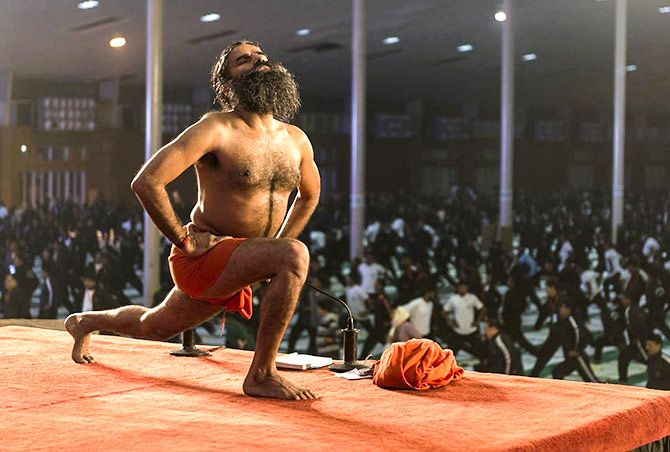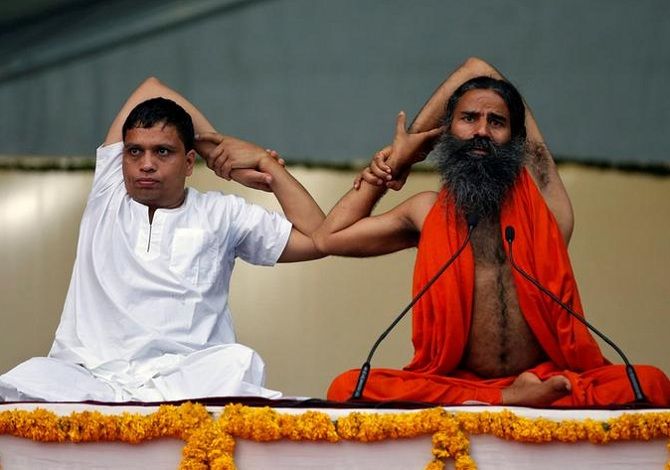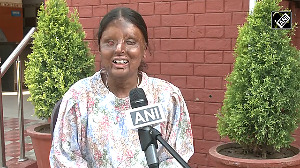'The wonderful thing about being a journalist is that when someone tries to muzzle your work, it's a badge of honour.'
'You know you've done something right,' Priyanka Pathak-Narain, the author of Godman To Tycoon: The Untold Story Of Baba Ramdev, tells Sunil Sethi.

No bigger godman or yogi looms larger on the Indian scene today than Baba Ramdev -- many previous ones, from Maharishi Mahesh Yogi to Dhirendra Brahmachari to Bhagwan Rajneesh aka Osho, can't hold a candle to his light.
In a salivating new millennium twist to earlier healers of body and soul, Ramdev has scaled up spiritual therapy into an unprecedented retail empire in recent years.
Revenues of his Patanjali Ayurveda, purveyors of more than 500 products from shampoos and ghee to noodles and swadeshi jeans, were estimated at Rs 10,000 crore (Rs 100 billion) this year, growing at 100 per cent annually and spooking the likes of ITC, Dabur, Hindustan Unilever and Colgate-Palmolive.
'Colgate ka gate bhi band hoga', 'Pantene ka to pant gila hone wala hai', 'Unilever ka lever bhi baithega' (Colgate will shut its gates, Pantene will wet its pants, Unilever's lever will break down) he announced in an attack on his competitors not long ago.
- 'Ramdev is a symptom of today's India' ,/strong>
How a sickly village boy from a dirt poor corner of Haryana metamorphosed into a fast moving consumer goods giant and a television star is not only the stuff of corporate might cresting a wave of religiosity but a cracking good tale.
The bushy-bearded, saffron-clad yogi's grinning visage is writ above glow signs announcing 'Baba Ramdev ka Mega Store' everywhere, but his life story is the subject of a legal writ.
Last month, he moved a Delhi district court restraining the publication of a gripping biography, Godman To Tycoon: The Untold Story Of Baba Ramdev by Mumbai-based journalist Priyanka Pathak-Narain (Juggernaut).
Ms Pathak-Narain spent 10 years piecing together the tale, interviewing not only Ramdev but his family, followers, associates and adversaries. (She appends 25 pages of source notes at the end of a slim volume.)
It is a chronicle of astonishing gumption and reinvention; and of bitter intrigue, takeover battles of ashrams to TV channels, forays into national politics, feuds, falling outs and, yes, crime.
From selling chawanprash on a bicycle in Haridwar to running phenomenally successful yoga camps and Ayurveda outlets (consultations are free, but the medicines are not), how did Ramdev become a 'Pied Piper who could make his stomach churn and ripple, wrap his legs around his neck and dazzle viewers with dreams of eternal youth and instant good health'?
For every ally Ramdev lost, found and dumped, he also made enemies.
Among the mysteries Ms Pathak-Narain uncovers are the murder of Swami Yogananda, an early Ramdev supporter, and the disappearance of Ramdev's 'saintly' guru, Shankar Dev; of his financial backers such as K K Pittie and Sarvan Poddar (the latter donated a Scottish island to his UK trust); investigations into charges of sales tax evasion; and his forays into high politics, wooing Mulayam Singh Yadav, teaming up with Anna Hazare and taking on the CPI-M's Brinda Karat, who alleged the use of human and animal bones in his medicines.
Some details of the Ramdev story -- for instance, the year of his birth -- are lost in his transformation from impoverished village lad to a powerful guru.

His godman status also prohibits him from any direct pecuniary connection; he owns no part of Patanjali Ayurveda and allied enterprises; yet Acharya Balkrishna, his chief aide, is the 26th richest Indian, worth Rs 25,600 crore (Rs 256 billion).
To create as dispassionate a narrative, the author says that she principally told Ramdev's story through the voices of those who knew him.
Nevertheless, the injunction against her book calls it defamatory and damaging on several counts, citing, among other objections, a Reuters report alleging that the yogi 'received $46 million in land allocations and discounts from BJP-led state governments' and that in some Haryana villages Baba Ramdev is popularly known as 'Lala Ramdev'.
Restraint orders against books are an old, dishonoured practice, in part because of the glacial pace at which lower courts move.
The late Khushwant Singh had to battle it out for years with Maneka Gandhi over the publication of his memoir; more recently, Jayalalithaa tried to suppress a book on her life.
American Indologist Wendy Doniger's The Hindus: An Alternative History was not only withdrawn from bookshops but pulped, raising an major outcry against growing curbs on freedom of expression.
Juggernaut publisher Chiki Sarkar has appealed the Ramdev writ and is determined to fight it, taking it to the high court which has a better and faster record in giving "great judgments" on such issues.
As for Priyanka Pathak-Narain, she is confident that her story of Baba Ramdev will reach a wider public.
She told me, "The wonderful thing about being a journalist is that when someone tries to muzzle your work, it's a badge of honour. You know you've done something right."








